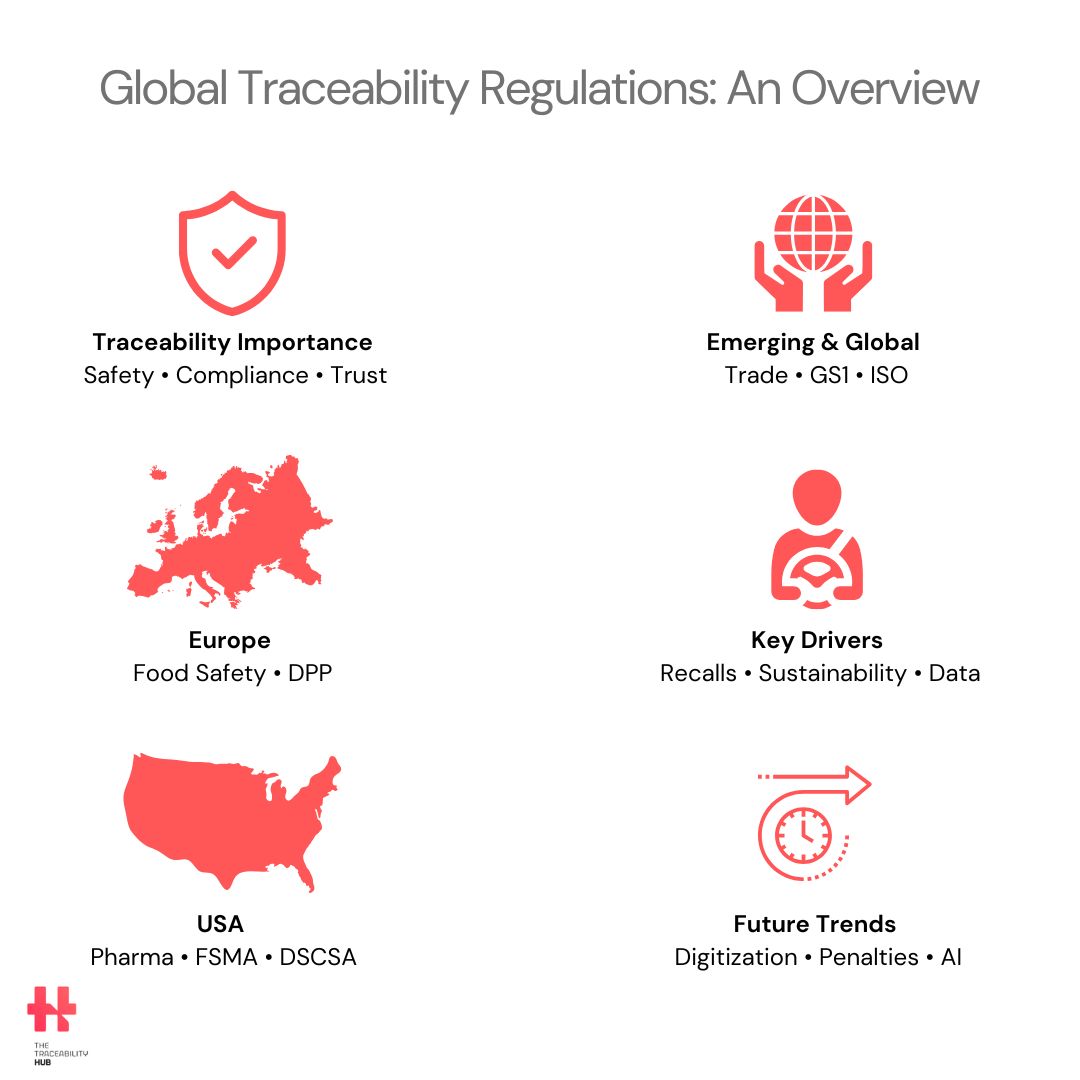From food and pharma safety to sustainability, global traceability regulations shape global industries by ensuring supply chain transparency and supply chain compliance.
With evolving laws across regions, businesses must navigate complex requirements to mitigate supply chain risks and adhere to regulatory frameworks.
Explore how global traceability frameworks differ and what the future holds for regulatory enforcement and digital tracking solutions.
The Global Landscape of Traceability Regulations
Global Traceability Regulations: An Overview

Traceability regulations are primarily driven by product safety and fraud prevention.
Governments and industry bodies worldwide establish regulatory frameworks to ensure that products can be tracked throughout the supply chain.
The European Union enforces stringent regulations such as the EU Food Safety Regulation and the Digital Product Passport (DPP) initiative.
In the U.S., laws like the FDA’s Drug Supply Chain Security Act (DSCSA) and the Food Safety Modernization Act (FSMA) focus on pharmaceutical and food traceability.
Different regions take distinct regulatory approaches.
The EU mandates strict compliance with legal penalties for violations, while the U.S. adopts a mixed approach, involving both government agencies and industry groups.
Emerging economies are introducing regulations to align with international trade standards, contributing to the broader future of traceability.
Key Regulatory Themes Across Industries
Product Safety & Recalls
Industries such as food, pharmaceuticals, and consumer goods implement traceability regulations to ensure product safety and facilitate recalls.
Food safety laws like FSMA and the EU General Food Law recommend tracking ingredients and finished products to prevent contamination.
The pharmaceutical industry follows serialization laws, including the EU Falsified Medicines Directive and the U.S. DSCSA, to combat counterfeit drugs.
Sustainability & Ethical Sourcing
Sustainability regulations demand supply chain transparency, particularly in the fashion, electronics, and automotive industries.
Laws like the German Supply Chain Act and the EU Green Deal push companies to trace raw materials and ensure ethical sourcing.
The automotive sector, especially in electric vehicle (EV) batteries, must comply with traceability requirements to monitor sourcing and recycling.
The Digital Product Passport (DPP) is a significant initiative in the EU aimed at enhancing transparency and sustainability in the car battery industry.
DPP is designed to provide detailed information about the entire lifecycle of a battery, from raw material extraction to production, usage, and recycling.
Data Standardization & Interoperability
Data standardization is crucial for global traceability compliance.
Organizations like GS1 and ISO set frameworks for data sharing, ensuring seamless product tracking.
Tools such as GS1 barcodes and RFID tagging support traceability in regulated industries.
Future Trends in Traceability Regulations
As the future of traceability unfolds, regulations are shifting towards digital tracking solutions.
Increasing Digitization & Real-Time Tracking
Regulations are shifting towards digital traceability solutions.
Businesses and governments are investing in AI and IoT to enhance visibility, data collection and security across supply chains, enabling real-time tracking
Greater Enforcement & Penalties for Non-Compliance
As regulatory frameworks become more stringent, stricter traceability enforcement measures are being implemented. Companies failing to comply may face financial penalties, legal actions, and reputational damage.
Regulatory bodies are ramping up audits and requiring more comprehensive data reporting.
The Role of Emerging Tech
AI and IoT play a growing role in supply chain compliance.
AI enhances risk assessment, and IoT enables real-time tracking. These technologies are shaping the future of traceability enforcement.
Global Traceability Regulations: Next Steps
Global traceability regulations ensure safety, transparency, and sustainability, avoid counterfeiting and control grey markets.
As regulatory frameworks evolve, businesses must stay complaint, informed and up to date to mitigate supply chain risks and maintain consumer trust and brand integrity.
Understanding these laws is crucial for companies in regulated markets.
Read more: The Role of Digital Product Passports (DPP) in Compliance.





